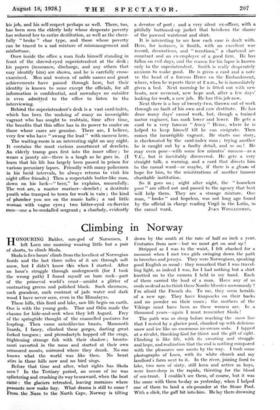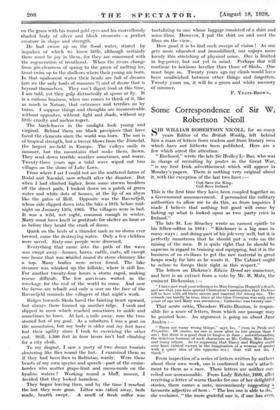Climbing in Norway
ONOURING Balder, sun-god of Norsemen, I 1-1- left Loen one morning wearing little but a pair of shorts, to climb Skola.
Skola is five hours' climb from the loveliest of Norwegian fiords and the last three miles of it are through soft snow, but I didn't know this when I started. After an hour's struggle through undergrowth (for I took the wrong path) I found myself on bare rock—part of the primeval world's crust—amidst a glitter of contrasting greens and polished black. Such sheerness, such grandeur, such contrast of jade water and dark wood I have never seen, even in the Himalayas.
These hills, this fiord and lake, saw life begin on earth. One is with the young gods. Thor and Odin made the chasms for hide-and-seek when they left Asgard. Frey of the springtide thought of the enamelled pastures for leapfrog. Then came antediluvian beasts. Mammoth lizards, I fancy, climbed these gorges, darting great forked tongues ; and pterodactyls hopped off the crags, frightening strange fish with their shadow ; bronto- sauri cavorted in the moss and started at their own armoured snouts, mirrored where they drank. No one knows what the world was like then. No beast stirs in these hills now and no bird sings.
Before that time and after, what sights has Skola seen ? In the Tertiary period, an ocean of ice was splintering and crushing its way to seaward, when the heat came : the glaciers retreated, leaving moraines where peasants now make hay: What drama is still to come ? From the Naze to the .North Cape, Norway is tilting down by the south at the rate of half an inch a year. Centuries from now—but we must get on and up !
Stripped as I was to the waist, I felt abashed for a moment when I met two girls swinging down the path in breeches and jerseys. They were Norwegians, speaking good English as usual : they remarked that I was travel- ling light, as indeed I was, for I had nothing but a shirt knotted on to the camera I held in my hand. Each of them carried the load of a man. Have any of us souls so dead as to think these Nordic blondes unwomanly ? I'm afraid the French do. To me, they seem heralds of a new age. They have knapsacks on their backs and no powder on their noses ; the mothers of the Vikings must have been as these women are. In a thousand years—again I must remember Skola !
The path was so steep before reaching the snow line that I rested by a glacier pool, chunked up with delicious snow and ice like an enormous ice-cream soda. I lapped at a rivulet, thanking God for thirst and the gift of sight. Climbing is like life, with its sweating and struggle and hope, and realization that the end is nothing compared with the pleasures one meets by the way. I took some photographs of Loen, with its white church and my landlord's farm next to it. In the river, joining fiord to lake, two men of sixty, still keen and active as boys, were knee-deep in the rapids, thirsting for the blood of sea-trout. I couldn't see them, of course, but it was the same with them to-day as yesterday, when I helped one of them to. land a six-pounder at the Stone Pool. With a click, the gaff bit into him. He lay there drowning on the grass with his round gold eyes and his marvellously shaded body of silver and black crescents—a perfect creature in shape and strength. He had swum up on the flood water, stirred by impulses of which we know little, although certainly there must be joy in them, for they are concerned with the regeneration of trouthood. When the rivers change from gin-clearness of spring to the green of melting ice, trout swim up to the shallows where their young are born. In that opalescent water their heads are full of dreams (are we the only lords of romance?) and of desire that is beyond themselves. They can't digest food at this time, I am told, yet they gulp distractedly at spoon or fly. It is a curious business, when one comes to think of it, like so much in Nature, that entrances and terrifies us by turns. I suppose things and thoughts are inconceivable without opposites, without light and shade, without my little cruelty and useless regret. The birch-leaves in the sunlight look young and virginal. Behind them are black precipices that have faced the elements since the world was born. The sun is of tropical strength, but a breeze blows from the JOstedal, the largest ice-field in Europe. The valleys smile in summer, but the mountains that make them, frown. They send down terrible weather sometimes, and worse. Twenty-three years ago a tidal wave wiped out two villages on the shore of Lake Loen. From where I sat I could not see the scattered farms of BOdal and Naesdal, now rebuilt after the disaster. But when I had climbed higher, from some strewn boulders off the direct path, I looked down on a patch of green water and white dots of houses, at the lip of an abyss like the gates of Hell. Opposite was the Ravnefjell, whose side slipped down into the lake a little before mid- night on January 15th, 1905. The villagers were in bed. It was a wild, wet night, common enough in winter. Many must have knelt in gratitude for shelter an hour or so before they heard the crack of doom. Quick on the heels of a thunder such as no storm ever brewed, came the destroying water. Only a few children were saved. Sixty-one people were drowned, Everything that came into the path of the wave was swept away—houses, barns, cattle, carts, all except one house that was whirled round its stone chimney like a top. Many bodies were never found. The lake steamer was whisked up the hillside, where it still lies. For another twenty-four hours a storm raged, making rescue difficult. The few survivors waited in the wreckage for the end of the world to come. And now the farms are rebuilt and only a scar on the face of the Ravnefjeld reminds the villagers of that night's work. Ridges towards Skola lured the fainting heart upward, but always there loomed up another ridge. I sank and slipped in snow which reached sometimes to ankle and sometimes to knee. At last, a mile away, rose the two- storied hut of my goal. As a subaltern I was a goat on the mountains, but my body is older and my feet have lost their agility since I took to exercising the other end. Still, 4,500 feet in four hours isn't bad climbing for a city clerk. To my disgust, I saw a party of two dozen tourists clustering like flies round the hut. I examined them as if they had been ibex in Baltistan, warily. Were these beasts of my own species and speech—part of the cruise- hordes who scatter grape-fruit and menu-cards on the hyaline waters? Working round -a bluff, unseen, I decided that they looked harmless. • They began leaving then, and by the time I reached the hut they were gone. Litter- was tidied away, beds made, hearth swept.. A ,smell • of fresh coffee was tantalizing to One whose luggage consisted of a shirt and some films. However, I put the shirt on and used the films on the view. How good it is to find such sweeps of vision! As one gets more educated and immobilized, one enjoys more keenly this stretching of physical sense. One is limited in leg-power, but not yet in mind. Perhaps that will continue to horizons lovelier than those of Skola. One must hope so. Twenty years ago my climb would have been sandwiched between other things and forgotten. Twenty years on, it will be a green and white memory of summer. F. YEATS-BROWN.

































 Previous page
Previous page